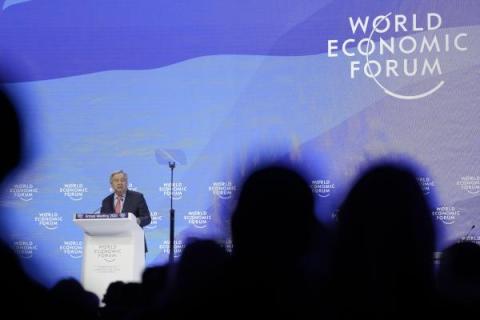
Saadia Zahidi, 38-years-old, is a member of the WEF’s managing board
She agrees that the WEF has a challenge on the low level of female participation at Davos
DAVOS: The annual meeting of the World Economic Forum (WEF), which kicks off tomorrow in the Swiss resort of Davos, is predominantly a late-middle-aged male affair. About 78 percent of the attendees in 2019 are men, with an average age of 54.
Saadia Zahidi is a breath of Alpine fresh air in this clubby world of macho power players. The 38-year-old member of the WEF’s managing board, and head of its Center for the New Economy and Society, is a rising star at the forum, and a key shaper of its thinking on social, gender and employment issues.
She agrees that the WEF has a challenge on the low level of female participation at Davos. But she believes that only reflects the wider world, where despite years of recognizing the need for gender equality in politics, business and society at large, women are still a minority when it comes to the commanding heights of the policymaking process.
“There’s a long way to go to get to 50/50 participation at Davos, but that reflects a global problem, reflecting the practices of global leadership,” she said. Only single-digit percentage proportions of the leaders of the world’s biggest corporations are female, while only a slightly bigger number of heads of state are women, she said, adding: “We have quite a way to go.”
As she recognizes, it is not just a WEF problem. Last year, she published a seminal work on gender equality as it especially related to the Middle East and the wider Muslim world. It is entitled “Fifty Million Rising,” a reference to the number of women that have joined the workforce in Islamic economies.
The work was optimistic in tone, charting the progress of women as more equal participants in their economies, be they McDonald’s workers in Pakistan, IT technicians in Egypt, or running big conglomerates in Saudi Arabia. The underlying message was that the empowerment of women was inexorable.
By the end of last year, Zahidi seemed to have lost some of that positivity. A report authored by her for the WEF on the gender gap — the difference in pay and conditions for men and women doing more or less the same job — found that on average, female workers were paid just 63 percent of men’s wages for the same job.
The overall picture is that gender equality has stalled. The future of our labor market may not be as equal as the trajectory we thought we were on.
At current rates of progress, it would take 202 years to close that gap, leading her to conclude: “The overall picture is that gender equality has stalled. The future of our labor market may not be as equal as the trajectory we thought we were on.”
So what has gone wrong in the movement to empower women?
Zahidi identifies two main reasons for the lack of progress. “There have been big shifts in the labor market with greater use of technology and automation, and women have borne the greater brunt associated with those changes,” she said.
“There’s a perception that blue-collar men in manufacturing are being put out of work by automation, but many women in service sectors, especially in the emerging world, are feeling the effects just as much if not more.”
More women than ever are graduating from universities, but many are not qualified in the skills required in the modern digital world, in science, technology and maths.
The second reason is that many countries and societies are still not balancing domestic roles more efficiently between men and women. “It still seems to be women who have the main responsibility for unpaid care work, be it in child care, elder care or other aspects of home life,” she said.
“So women are less present in the paid economy than they are in the unpaid economy. It’s a structural factor, but you shouldn’t really need a business case to move forward on gender equality, because there’s also a very clear moral argument to be made.”
The movement for gender equality and female empowerment has been a factor in social and economic policymaking in many Arab Gulf economies, particularly in Saudi Arabia, where it is a prominent feature of the Vision 2030 reform plan.
-------
BIO
Born in Lahore, Pakistan, 1980
Education
•Smith College, Massachusetts, US — economics degree
•Graduate Institute, Geneva, Switzerland — master’s in international economics
•Harvard Kennedy School — master’s in public administration
Career
•Joined WEF as economist, 2003
•Currently head of WEF’s Center for the New Economy and Society; •member of managing board
-------
Zahidi agrees that there has been some progress in recent decades, with greater investment in girls’ education leading to more skilled women in employment and all the social and cultural changes that brings. That advancement can also lead to “pushback” by women against some of the cultural and social restraints imposed on them by conservative societies.
“It’s not surprising now that there are more questions being asked about the viability of something like the (Saudi) guardianship laws,” she said. “Largely speaking, the guardianship laws are an additional barrier, whether it’s a question of transport, the ability to get from point A to point B. Is it a question of availability of transport, or because you don’t have the permission of one person? It’s a barrier that women will face and men won’t face.”
Although probably best known for her work at the WEF on gender and employment issues, last year her role was broadened to take responsibility for the “new economics” that the forum views as essential in the age of the Fourth Industrial Revolution — the confluence of digital, technological and communications factors that the WEF sees as having a profound effect on economic relations.
In October 2018, Zahidi led a study group at a WEF meeting in Dubai on the subject of the new economy. Those deliberations resulted in the recent publication of a WEF white paper on the subject. Her enthusiasm on the topic is obvious and infectious.
“It was an exercise in how to offer newer as well as the traditional voices on how we manage and direct our economy,” she said. She believes that modern economies, under pressure from digitalization and technological change amid volatile geo-economic conditions, have to seek answers to four big questions.
“First, do we need to fundamentally rethink what constitutes economic value, and what practical avenues exist for doing so?” she asked. She believes that new types of assets and economic activity are not well understood, and that new sources of consumer welfare are not adequately measured.
“What’s the value of the open knowledge on Wikipedia, or the toll taken by the incursion of digital technology into our private lives?” she asked. The answers will have fundamental repercussions for traditional methods of valuing economic activity, such as gross domestic product (GDP) and the price mechanism, she believes.
Second, Zahidi posed the question of whether, in the age of Big Data, we need to address the issue of the market concentration created by online platforms. Digital platforms bring undoubted benefits in terms of new services, greater choice, faster access and lower costs.
There’s a long way to go to get to 50/50 participation or men and women at Davos, but that reflects a global problem.
“Yet at the same time, scale and the resulting concentration of market power can offset some of these benefits, with potential repercussions on innovation, quality and distributional outcomes,” she said, adding that we need to think again about the regulatory regimes that govern the digital economy.
Third, the new economics must consider whether policymakers need to put in place practical measures for job creation. Technology and automation are forcing major transformations on employment practices. “If managed wisely, these transformations could lead to a new age of good work, good jobs and improved quality of life for all. If managed poorly, they pose the risk of greater inequality and broader polarization,” she wrote in the white paper.
Finally, the new economics must consider the need for new social “safety nets” for those who get left behind by the rapidly changing digital transformation. “In developed economies, the efficacy of social insurance policies tied to formal work and stable employment contracts is depleting, as increasing numbers of people become displaced or experience insecure work, low pay and unequal access to good jobs,” she said.
“In developing economies, where work has largely been diverse and informal, technological advances look set to continue that trend and offer additional flexible work opportunities, leaving open the question of what a future social protection model might look like.”
These issues will be among the questions considered at Davos 2019. Despite the withdrawal from the annual meeting of some prominent regular attendees — most of the US government sector, for example — Zahidi is confident that it will be another success. “My main aim this year is to raise and discuss issues that are starting to pose challenges, and to build coalitions to tackle them,” she said.












